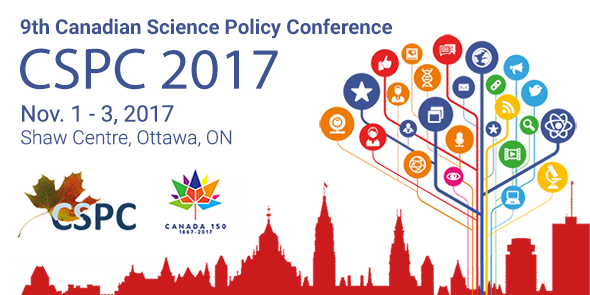Suzuette Soomai, Postdoctoral Fellow with the Environmental Information: Use and Influence research program, attended the 9th Canadian Science Policy Conference (CSPC) in Ottawa, 1-3 November 2017. Suzuette participated in a panel, “Science for Decision-Making at Fisheries and Oceans Canada: The Past, Present, and Future,” organized by the Canada Department of Fisheries and Oceans (DFO). The other panelists included: Steven Cooke, Professor and Canada Research Chair at Carleton University; Nicholas Winfield, Director General, Ecosystems Management, Ecosystems and Fisheries Management, DFO; and Sophie Foster, Acting Director, Canadian Science Advisory Secretariat (CSAS). The panel discussed the origins and current practises of DFO’s CSAS process. The challenges and visions for the future of CSAS were also highlighted by panelists representing DFO’s Science and Management branches. Drawing on her doctoral and postdoctoral research, Suzuette described the information pathways – production, communication, and use of scientific information – in decision-making in DFO. The takeaway messages and recommendations of the panel include:
- The Canadian Science Advisory Secretariat process is the mechanism by which Fisheries and Ocean Canada provides peer-reviewed science advice that is used by DFO and made available to the public.
- The CSAS process informs most advice provided to the Minister on key issues.
- The CSAS process is effective because it produces credible, relevant, and legitimate information.
- Studies of how information flows within organizations should continue to help organizations evaluate or modify practices to increase the credibility, relevance, and legitimacy of the information they produce.
- The science community can organize around upcoming problems to produce evidence for use in the CSAS process.
- DFO does not work in a world of absolute certainties: science-based evidence is one input in the decision-making process.
- Funding could be made available to researchers for conducting research and producing research documents for use in the CSAS process.
- Researchers can use CSAS documents, which outline uncertainties and gaps in knowledge, to justify future funding.
- Information use in the CSAS process is a clear demonstration of research impact.
- External experts could come to the process earlier to help define the management questions and support the strategy for collecting research evidence.
- Systematic reviews could be incorporated into the CSAS process, helping to make the process comparable and reproducible.
The proceedings of CSPC 2017 are available from the Canadian Science Policy Centre and include reports and takeaways for each panel session, as well as related audio recordings and videos. Since 2009, the CSPC meets annually as a forum for non-partisan, national dialogue on science, technology, and policy. Each year, the conference attracts politicians, professionals from government (federal and provincial) and industry, university researchers, and individuals from the non-profit sector. An interview with Suzuette, along with interviews of other conference participants, is posted on the CSPC’s YouTube site.
Author: Suzuette Soomai

